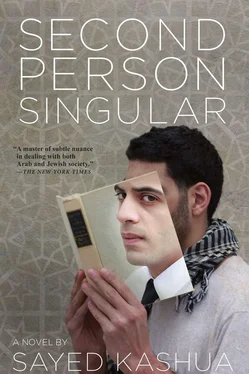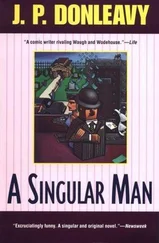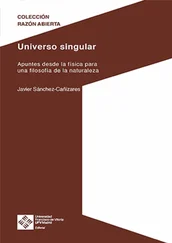Wassim would come back at three in the afternoon. If he hadn’t eaten anything on the way home, we’d fry up some sausage and eggs or make some tuna and cream cheese and eat together. After that he’d rest for an hour before his evening shift at the hostel. Majdi, I barely saw.
I stopped sleeping during the night shift, remaining awake until Osnat showed up in the morning. Ever since I told her that I had left the social services job and that I didn’t mind if she came in a little late, she started showing up at eight in the morning. She was very happy with the new arrangement, even said that her husband was going to buy me a present because he wasn’t in charge of getting the kids off to school in the morning anymore. “We almost got divorced over it,” she said, laughing.
I spent the sleepless nights listening to music and reading Yonatan’s books. There were 156 books on the shelves and 98 CDs on the racks, 70 in English and 28 in Hebrew. Yonatan had written his name on the inside jacket of his discs, too. He had nice handwriting, very delicate, like a good student or a pretty girl.
On one of the top shelves he had a fine collection of hardcover art books. Most of them were photography-related. They looked old, filled with black-and-white photos. I looked through the photos occasionally, but mostly I was interested in the Hebrew fiction. I must have averaged a book every three shifts. Some I liked more than others, but I made a point of reading each one all the way through.
There was nothing for me in Jerusalem. I was an unemployed social worker. The night shift with Yonatan wasn’t really a job and the salary I got barely covered the rent for my little room in Beit Hanina. I knew I wouldn’t be able to spend much more time in this city, and each night I would decide that it was time to go back to the village, to my mother, but when the sun came up and the shift was over, I’d delay my return by another day. Sometimes I’d lean on the windowsill of the open attic window and take in giant gulps of fresh air, telling myself that everything would work out, that a new job was waiting for me right around the corner. After all, there was always a lack of social workers. I’d go to the social services’ main branch, show them my diploma, and ask for a position, this time in the western half of the city. I’d show them that my Hebrew was as good as any native speaker’s and I’d tell them that the problem with the outpatient clinic in the Arab part of town was my colleagues’ miserable work ethic. I’d speak disparagingly of Arabs and the Jewish interviewer would nod; he knew what went on down there. This guy came to social work as a calling, he’d think to himself, not like the rest of the Arabs who studied it just because it was the only department that they could get in to. Everyone knows that Arabs study a trade in university. Everyone knows they want to be doctors or lawyers or accountants or at least registered nurses, and that their fallback options are education and social work. The university application gives you six department options and the Arab applications are all identical. My application had also had medicine on top and education on the bottom.
Once I finish charming the interviewer from social services, I’ll go straight to the Mount Scopus dorms and knock on Leila’s door and apologize for disappearing. I’ll tell her everything I told the interviewer. She’ll definitely identify with what I have to say and will understand how disgusted I was with the outpatient clinic. She’s not like them, she’s different — for some reason I had the feeling that she must have put social work first on her application. I’ll tell her that I love her, that I’m starting my master’s, that I’ll definitely get a PhD and that it won’t take me long to become a professor. I have the grades. I’ll get a faculty position and be able to support her and she’ll be proud of me and won’t be ashamed to take me to her parents and their faces will shine when they learn that their daughter has snagged herself a professor. I’ll tell her that I’m rich, not me personally, but that my family owns lots of land, and that will not be a lie but a statement of fact. Her parents could ask anyone in the Triangle about my father’s family and they’d hear that they were the biggest landowners in the region. True, I’m not in contact with them, but I am a legal heir and any court of law would give me my father’s land. I am the only heir and I could be rich. All I have to do is demand what is rightfully mine. “How long will you sit around idly,” I have heard my mother say, over and over. “It’s your future, your land.”
Tomorrow — that was the conclusion I drew from all of those nighttime thoughts, not now, tomorrow. Tomorrow I’ll go to social services main branch. Tomorrow I’ll go home and start to wage my war against my family. Tomorrow I’ll launch the campaign to restore my mother’s pride. Tonight I’ll finish the chapter of this book I’m holding and then I’ll go back to the apartment to be alone.
PASSPORT PHOTO
I learned everything there was to know about Yonatan during those sleepless nights. I read every scrap of paper, every note, and every document that I found in the drawers.
Yonatan was born in 1979. Just like me. In his small, square ID photo he made a point of looking serious, not smiling, and in his eyes I saw a melancholic look that I interpreted as sixteen-year-old sincerity. Mother’s name: Ruchaleh. Father’s name: Yakov. Address: Same. Nationality: Jewish.
That was the first time I’d seen a Jew’s identity card. I had thought that the nationality article on the IDs was something only Arabs had, so they could be separated from the pack, but it turned out that Jews had to be categorized, too.
In one of the lower drawers there were drawings that looked like they might be relics from Yonatan’s kindergarten days. Blue, black, and red lines and a few attempts at circles. His report cards from first through twelfth grade, his class pictures. It was always fun looking for his face in the pictures and once I found it I’d look carefully at the other kids. They were all white and they almost all had European names, some of them Hebraized. Yonatan had gone to the local public school until sixth grade and then transferred to the elite Leyada School on the Givat Ram campus of Hebrew University. He had pretty much straight As all through school. I could see from the report cards that the Jews had a different system than we did. Instead of Arabic they had Hebrew and in third grade they started English; in junior high he took Jewish history and Bible instead of Koran. He also had art and computers, while in the village we had a few subjects that were not on Yonatan’s transcripts, like carpentry and metalwork and Islamic religious studies.
He went to the Jerusalem High School for the Arts and majored in photography. There were shoe boxes in some of the drawers with black-and-white photos and, based on his grades and the comments his teachers left on his work, it was clear that he had done exceptionally well. For his foreign language requirement, he took French.
On one of the top shelves in his closet I found a padded black case that looked like it might hold some kind of medical equipment. I got up on a chair and coaxed the box out. As I shimmied it free, I felt that Yonatan had turned his head and was watching me, as though he’d caught me in the act. But Yonatan was in the same position, face and eyes turned the other way, always away from me, especially when I went through his things and invaded his privacy. The case held Yonatan’s camera. A big camera, the kind journalists had, nothing like the little ones I’d seen at home. I put it on the table, sat with my back to Yonatan, and pulled the camera out of the main compartment. It was heavier than I expected. Alongside it, in their own compartments, were a few different lenses and a few rolls of film. I took one of the round lenses out of the case and tried to fit it onto the camera, cautiously, slowly, till I heard it click into place. I picked up the camera, looked through the viewfinder, and saw nothing but blackness. I checked the lens and saw that I hadn’t removed the cap, and then I looked back through the viewfinder and saw before me a blurry, out-of-focus world.
Читать дальше












